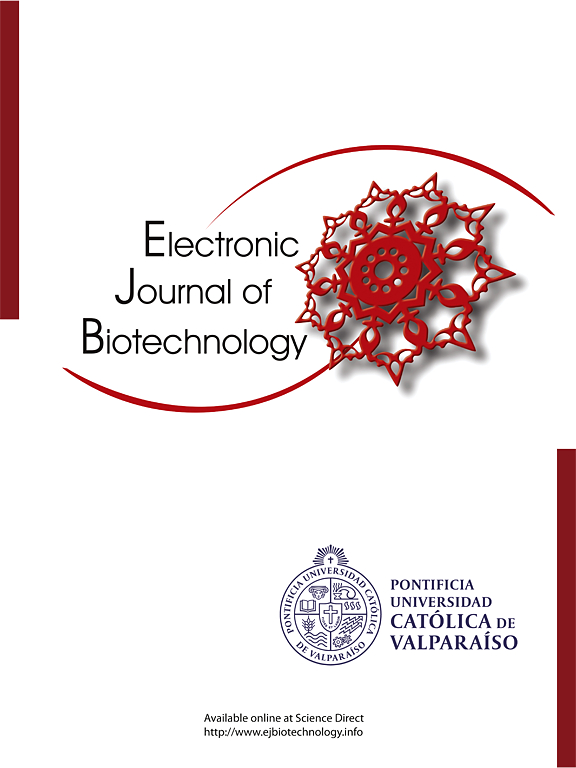ALYREF通过稳定PCSK9 mRNA促进结肠癌细胞的恶性行为并抑制铁下垂
IF 2.5
4区 生物学
Q3 BIOTECHNOLOGY & APPLIED MICROBIOLOGY
引用次数: 0
摘要
背景:结肠癌是一种普遍存在的恶性肿瘤,在全球范围内具有很高的发病率和死亡率。RNA甲基转移酶Aly/REF输出因子(ALYREF)结合5-甲基胞嘧啶(m5C)修饰的信使RNA,是癌症诊断和治疗的潜在靶点。然而,其在结肠癌进展中的具体作用和机制尚不清楚。结果salyref在结肠癌组织和细胞系中的表达明显高于正常对照组。ALYREF的缺失抑制结肠癌细胞的增殖、迁移和侵袭,同时促进细胞凋亡和铁下垂。分析显示,蛋白转化酶subtilisin/ keexin type 9 (PCSK9)在结肠癌中高表达,并受到ALYREF的正调控。在机制上,ALYREF以依赖于m5C修饰的方式直接结合并稳定PCSK9信使RNA。至关重要的是,ALYREF敲低导致的抗肿瘤作用通过过表达PCSK9被逆转。与细胞研究结果一致,在异种移植模型中,沉默ALYREF显著抑制肿瘤生长。结论本研究表明,ALYREF通过m5C甲基化稳定PCSK9信使RNA,从而提高PCSK9的表达,从而驱动结肠癌恶性肿瘤。这些发现确立了ALYREF/PCSK9轴在结肠癌进展中的关键机制,突出了其作为新的干预治疗靶点的潜力。引用方式:曹磊,陈毅,余杰,等。ALYREF通过稳定PCSK9 mRNA促进结肠癌细胞的恶性行为并抑制铁下垂。中国生物医学工程学报(英文版);2009;38。https://doi.org/10.1016/j.ejbt.2025.07.003。本文章由计算机程序翻译,如有差异,请以英文原文为准。

ALYREF promotes malignant behaviors and inhibits ferroptosis in colon cancer cells by stabilizing PCSK9 mRNA
Background
Colon cancer is a prevalent malignancy causing significant global morbidity and mortality. The RNA methyltransferase Aly/REF export factor (ALYREF), which binds 5-methylcytosine (m5C)-modified messenger RNA, represents a potential diagnostic and therapeutic target in cancer. However, its specific role and mechanism in colon cancer progression remain unexplored.
Results
ALYREF expression was significantly elevated in colon cancer tissues and cell lines compared to normal controls. Depletion of ALYREF suppressed colon cancer cell proliferation, migration, and invasion, while simultaneously promoting apoptosis and ferroptosis. Analysis revealed proprotein convertase subtilisin/kexin type 9 (PCSK9) is highly expressed in colon cancer and positively regulated by ALYREF. Mechanistically, ALYREF directly bound to and stabilized PCSK9 messenger RNA in a manner dependent on m5C modification. Crucially, the anti-tumor effects resulting from ALYREF knockdown were reversed by overexpressing PCSK9. Consistent with cellular findings, silencing ALYREF significantly inhibited tumor growth in vivo using xenograft models.
Conclusions
This study demonstrates that ALYREF drives colon cancer malignancy by stabilizing PCSK9 messenger RNA via m5C methylation, thereby enhancing PCSK9 expression. These findings establish the ALYREF/PCSK9 axis as a critical mechanism in colon cancer progression, highlighting its potential as a novel therapeutic target for intervention.
How to cite: Cao L, Chen Y, Yu J, et al. ALYREF promotes malignant behaviors and inhibits ferroptosis in colon cancer cells by stabilizing PCSK9 mRNA. Electron J Biotechnol 2025;78. https://doi.org/10.1016/j.ejbt.2025.07.003.
求助全文
通过发布文献求助,成功后即可免费获取论文全文。
去求助
来源期刊

Electronic Journal of Biotechnology
工程技术-生物工程与应用微生物
CiteScore
5.60
自引率
0.00%
发文量
50
审稿时长
2 months
期刊介绍:
Electronic Journal of Biotechnology is an international scientific electronic journal, which publishes papers from all areas related to Biotechnology. It covers from molecular biology and the chemistry of biological processes to aquatic and earth environmental aspects, computational applications, policy and ethical issues directly related to Biotechnology.
The journal provides an effective way to publish research and review articles and short communications, video material, animation sequences and 3D are also accepted to support and enhance articles. The articles will be examined by a scientific committee and anonymous evaluators and published every two months in HTML and PDF formats (January 15th , March 15th, May 15th, July 15th, September 15th, November 15th).
The following areas are covered in the Journal:
• Animal Biotechnology
• Biofilms
• Bioinformatics
• Biomedicine
• Biopolicies of International Cooperation
• Biosafety
• Biotechnology Industry
• Biotechnology of Human Disorders
• Chemical Engineering
• Environmental Biotechnology
• Food Biotechnology
• Marine Biotechnology
• Microbial Biotechnology
• Molecular Biology and Genetics
•Nanobiotechnology
• Omics
• Plant Biotechnology
• Process Biotechnology
• Process Chemistry and Technology
• Tissue Engineering
 求助内容:
求助内容: 应助结果提醒方式:
应助结果提醒方式:


